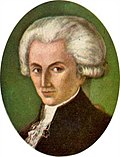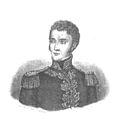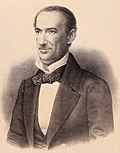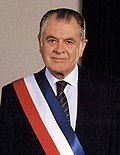| No. | Portrait | Name
(Birth–Death) | Term of office | Party | Elected |
|---|
| Took office | Left office |
|---|
| Time in office |
|---|
| 18 [i] |  | Arturo Alessandri
(1868–1950) | 12 March 1925 | 1 October 1925 | | Liberal | 1920 |
|---|
| 203 days |
| Acting |  | Luis Barros Borgoño
(1858–1943) | 1 October 1925 | 23 December 1925 | | Liberal | Minister of the Interior acting as vice president. |
|---|
| 83 days |
| 19 [j] |  | Emiliano Figueroa
(1866–1931) | 23 December 1925 | 10 May 1927
(Resigned) | | Liberal Democratic | 1925 |
|---|
| 1 year, 138 days |
| Acting |  | Carlos Ibáñez del Campo
(1877–1960) | 10 May 1927 | 26 July 1931
(Resigned) | | Independent | Minister of the Interior acting as vice president. |
|---|
| 20 | 4 years, 77 days | 1927 |
|---|
| Acting |  | Pedro Opaso
(1876–1957) | 26 July 1931 | 27 July 1931
(Resigned) | | Liberal Democratic | President of the Senate acting as vice president. |
|---|
| 1 day |
| Acting |  | Juan Esteban Montero
(1879–1948) | 27 July 1931 | 20 August 1931
(Resigned) | | Radical | Minister of the Interior acting as vice president. |
|---|
| 24 days |
| Acting |  | Manuel Trucco
(1875–1954) | 20 August 1931 | 15 November 1931 | | Radical | Minister of the Interior acting as vice president. |
|---|
| 87 days |
| Acting |  | Juan Esteban Montero
(1879–1948) | 15 November 1931 | 4 June 1932
(Deposed) | | Radical | Minister of the Interior acting as vice president. |
|---|
| 21 | 202 days | 1931 |
|---|
| Junta |  | Arturo Puga
(1879–1970) | 4 June 1932 | 16 June 1932
(Resigned) | | Military | President of the Government Junta. |
|---|
| 12 days |
| Junta |  | Carlos Dávila
(1887–1955) | 16 June 1932 | 8 July 1932
(Resigned) | | Socialist | President of the Government Junta. |
|---|
| Acting | 22 days | Provisional President of the Socialist Republic of Chile since 8 July 1932. |
|---|
| Acting |  | Bartolomé Blanche
(1879–1970) | 13 September 1932 | 2 October 1932
(Resigned) | | Military | Provisional President. |
|---|
| 19 days |
| Acting |  | Abraham Oyanedel
(1874–1954) | 2 October 1932 | 24 December 1932 | | Independent | President of the Supreme Court acting as vice president. |
|---|
| 83 days |
| 22 |  | Arturo Alessandri
(1868–1950) | 24 December 1932 | 24 December 1938 | | Liberal | 1932 |
|---|
| 6 years |
| 23 | 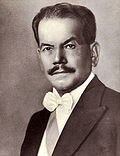 | Pedro Aguirre Cerda
(1879–1941) | 24 December 1938 | 25 November 1941
(Died in office) | | Radical | 1938 [k] |
|---|
| 2 years, 336 days |
| Acting | 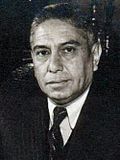 | Jerónimo Méndez
(1887–1959) | 25 November 1941 | 2 April 1942 | | Radical | Minister of the Interior acting as vice president. |
|---|
| 97 days |
|
| 24 |  | Juan Antonio Ríos
(1888–1946) | 2 April 1942 | 27 June 1946
(Died in office) | | Radical | 1942 |
|---|
| 4 years, 117 days |
| Acting |  | Alfredo Duhalde
(1898–1985) | 27 June 1946 | 3 August 1946
(Resigned) | | Radical | Minister of the Interior acting as vice president. |
|---|
| 37 days |
| Acting | 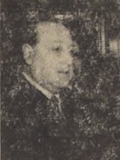 | Vicente Merino
(1889–1977) | 3 August 1946 | 13 August 1946
(Resigned) | | Military | Minister of the Interior acting as vice president. |
|---|
| 10 days |
| Acting |  | Alfredo Duhalde
(1898–1985) | 13 August 1946 | 17 October 1946
(Resigned) | | Radical | Minister of the Interior acting as vice president. |
|---|
| 65 days |
| Acting |  | Juan Antonio Iribarren
(1885–1968) | 17 October 1946 | 3 November 1946 | | Radical | Minister of the Interior acting as vice president. |
|---|
| 17 days |
| 25 |  | Gabriel González Videla
(1898–1980) | 3 November 1946 | 3 November 1952 | | Radical | 1946 [l] |
|---|
| 6 years |
| 26 |  | Carlos Ibáñez del Campo
(1877–1960) | 3 November 1952 | 3 November 1958 | | Independent | 1952 |
|---|
| 6 years |
| 27 |  | Jorge Alessandri
(1896–1986) | 3 November 1958 | 3 November 1964 | | Independent | 1958 [m] |
|---|
| 6 years |
| 28 |  | Eduardo Frei Montalva
(1911–1982) | 3 November 1964 | 3 November 1970 | | Christian Democratic | 1964 |
|---|
| 6 years |
| 29 | 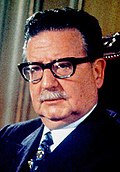 | Salvador Allende
(1908–1973) | 3 November 1970 | 11 September 1973
(Died in office) [n] | | Socialist | 1970 [o] |
|---|
| 2 years, 312 days |





